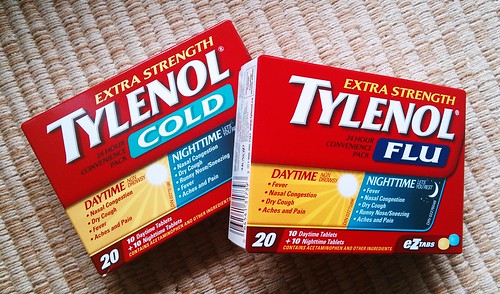It’s flu season. Every year people get vaccinated against the flu, also known as influenza. Now, researchers are looking at a long-lasting flu vaccine that does not need to be given annually.
– Image Source: Dennis S. Hurd, Flickr
A recent study shows that scientists may have found a new potential target to generate new vaccines against certain types of the flu. They focused on a protein called hemagglutinin found on the surface of viral influenza particles. This protein contains a head region, which undergoes constant genetic changes, as well as a stem region that does not change. Although current influenza vaccines are composed of the viral particles from the head region, researchers discovered a way to stabilize the stem region in order to create a vaccine. Their results showed that vaccinated mice and ferrets either had reduced symptoms or complete immunity against certain related influenza viruses.
A vaccine is produced from taking a virus and weakening it so that it is unable to replicate and cause harm within an individual. When the vaccine is injected, the body is tricked into thinking that the virus particles are dangerous, thus initiating an immune response and producing antibodies that destroy that specific virus particle. As a result, these antibodies reside in the body for long periods of time. Therefore, if in the future the real virus enters the body, you will have specific antibodies to protect you from the virus.
– Credit: TED-Ed
Although a new flu vaccine is produced every year, the effectiveness of the vaccine may vary. Each flu season, because the virus is constantly changing, researchers try to determine the specific types of influenza that are currently circulating and those that will be present in the coming year. Based on this information, a vaccine is produced consisting of multiple types of the virus, however, it is impossible for the vaccine to be 100% accurate. With the discovery of this new target area on hemagglutinin, it could lead to the production of one vaccine for a group of related influenza viruses.
– Credit: Discovery News
According to the Government of Canada, approximately 10-20% of the population becomes infected with influenza annually. Flu symptoms typically include fever, cough, and aches. Furthermore, there are 12,200 hospitalizations and 3,500 deaths each year. Individuals at greater risk for complications or hospitalization caused by the flu include people with other diseases and weakened immune systems, residents in chronic care facilities, people aged 65 or older, and pregnant women. Immunize BC emphasizes the importance of everyone getting vaccinated in order to prevent the spread of disease to others. Researchers are hoping that a longer-lasting flu vaccine will encourage more people to get vaccinated, and also reduce the cost associated with producing and administering seasonal flu vaccines.
However, we may still have to get our yearly flu shots for quite some time. Researchers, although very optimistic about the future of creating a new long-lasting vaccine, say that more research needs to be done to determine the efficacy in human models.
– Brian Infanti

